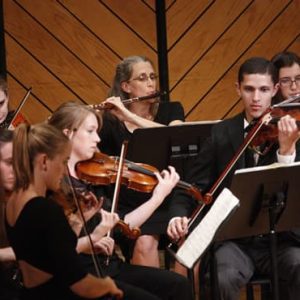University Operations

University granted NASM associate membership
UNC Charlotte has been granted associate membership in the National Association of Schools of Music (NASM).
Founded in 1924, NASM is an organization of schools, conservatories, colleges and universities with approximately 650 accredited institutional members. It establishes national standards for undergraduate and graduate degrees in music.

Technological advances prompted change in student education records policy
The Family Educational Rights and Privacy Act was passed 40 years ago, and recent changes to the University’s student education records policy address advances in technology since FERPA became law in August 1974.
“Our definition of directory information was similar to that of other colleges and universities across the country,” said Jesh Humphrey, deputy general counsel with the Office of Legal Affairs. “However, a couple of months ago, the chancellor asked the Office of Legal Affairs and the Registrar’s Office to review our policy to better protect our students’ privacy.”

Recent bill authorizes UNC Charlotte to fund campus projects
On Monday, Gov. Pat McCrory signed a bill that will enable six UNC system campuses, including UNC Charlotte, to fund construction projects.
UNC Charlotte will issue bonds to finance $129 million to complete four non-appropriated capital improvements that University leaders have identified as critical to campus growth.
“While some schools are seeing their numbers decline, demand for UNC Charlotte is growing dramatically in parallel to the Charlotte region’s rapid population increase,” wrote Chancellor Philip L. Dubois in an op-ed published in the Charlotte Business Journal.

Urban Insitute official among ‘courageous leaders’ named to latest class of Friday Fellows
Amy Hawn Nelson, director of research at the UNC Charlotte Urban Institute and director of its Institute for Social Capital, recently was named to the 2014-16 class of William C. Friday Fellows for Human Relations.
The goal of the Friday Fellowship is to cultivate a network of “courageous leaders who connect across differences in identity and ideas to develop new solutions to the complex challenges facing the people and communities of North Carolina through a human relations lens.”

CRI, South Village decks recognized for design excellence
The International Parking Association has given 2014 Awards of Merit to the University’s CRI Deck I and the South Village Deck.
For its competition, the association fielded entries from Australia, Canada, Europe, South America and the United States.

Williams named interim director of Lab Animal Resources
Effective May 1, Chandra Williams will be interim director for Lab Animal Resources. The appointment was announced by the Research and Economic Development Office.
With nearly two decades of professional veterinarian experience, Williams has served as a driving force in the development and implementation of a wide range of policies and procedures to ensure the proper use and care of animals for research purposes. She has dedicated her time and service to ensuring that researchers and facilities are equipped for the best care of research animals.

Yensan’s CRI appointment extended
With the opening of PORTAL, Charlotte Research Institute officials have announced that Lester “Chip” Yensan will remain at CRI as associate director for infrastructure through the current calendar year.
Prior to joining CRI in August 2012, Yensan was assistant vice president for student affairs at the University of Rhode Island; he held positions at the University of Connecticut and Michigan State University, too.

New online system to simplify Conflict of Interest Disclosures
Faculty and EPA staff may be familiar with the cumbersome and sometimes confusing paper process involved with submitting their Conflict of Interest (COI) Disclosures that are required annually by University Policy 102.2 “Conflicts of Interest and Commitment.” For the fall 2014 disclosure submission cycle, this paper process will be a thing of the past.

Rowan named conflict of interest manager
Barry Rowan recently joined the University as conflict of interest manager in the Research and Economic Development Department.
In coming to UNC Charlotte, Rowan brings solid experience in a number of areas related to research compliance from the Office of Research at the University of California Santa Barbara. Before that, he spent 10 years as laboratory manager in oceanography and cancer research facilities.

UNC Charlotte to hold fall commencement ceremonies Dec. 14
Commencement brings to mind the culmination of one’s academic journey—it also marks a beginning. It is the start of that next chapter, either undertaking advanced studies or entering the workforce. In either case, it is a cause for celebration.
Approximately 3,400 students, along with their families, friends and others, will gather for fall 2013 commencement ceremonies on Saturday, Dec. 14, in Halton Arena, located in the Barnhardt Student Activity Center.